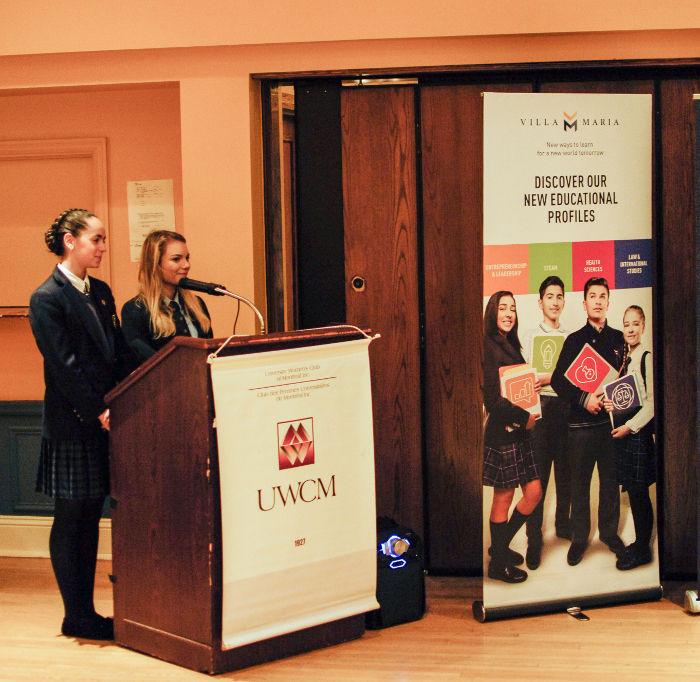On Nov. 15, the University Women’s Club of Montreal (UWCM) launched the first ever North American rendition of “Les Olympes de la Parole,” an academic competition that aims to engage young women in both local and global issues of gender inequality.
Les Olympes de la Parole was first launched in 2001 by the Association Française des Femmes Diplômées des Universités first launched Les Olympes de la Parole in 2001, an event that is now organized in multiple countries around the world. The competition was named after Olympe de Gouges, a French playwright and activist who was executed for treason in 1793 because of her work.
At the official launch of the competition, Saôde Savary, president of the UWCM, spoke to the importance of implementing "Les Olympes de la Parole" in Montreal.
“The UWCM believes it is now time for Canadian girls to join the global conversation to empower their voices, to support policies that foster a gender equal society and start paving the way for all the girls in North America,” Savary said. “Addressing gender inequality is a complex issue that requires multiple perspectives in order to create sound solutions.”
Several teams of students from Villa Maria College, The Study, and Sacred Heart School of Montreal will be spearheading their own projects centered around a common theme: How improved access to information technologies can empower young Indigenous women in Canada. Speaker Deidre Kahwinehtha Diome, Chair of the Kanawake Combined School Committee, emphasized how much she valued the acknowledgement offered by the UWCM toward her community.
“So often, there is a feeling of alienation that […] Indigenous people are alone in their struggle,” Kahwinehtha Diome said, “[But] when [the UWCM] decided [they] were going to launch this new initiative, Les Olympes de la Parole, [… they] chose [the] topic to be about us, people like me who are working in the trenches every day. And what that felt like to me, was caring, was compassion, was recognition for me and the struggle of all of our people.”
The UWCM invited representatives from all three secondary schools to speak at the launch of the competition. Maria Di Scala, a social studies teacher at Villa Maria, emphasized that today’s students are responsible for creating innovative solutions to issues of gender equity and access to technology.
“Olympe de Gouges herself is a prime example of what Villa Maria has always striven to do, to provide our students with the tools to critically reflect upon social injustices, particularly gender [inequality], and to use their passion and unique position as simultaneously oppressed and privileged in crafting creative and effective solutions,” Di Scala said. “De Gouges […] proved that the ultimate recipe to female empowerment is the combination of education, voice and perseverance.”
Students at The Study have witnessed firsthand how improving access to modern technologies can improve the learning experiences of young women and men. The Study is partnered with a sister school in Nicaragua, where seniors participate in a community service trip and raise funds to provide the school with laptops and printers. Two students from The Study, Mia Strack Van Schyndel and Delila Farias, spoke about the barriers significant to learning experiences.
“We realized that the best way to understand the challenges that Indigenous girls are facing is to speak directly to these women,” Van Schyndel said. “We [met] with Mayor [Madeleine] Redfern, the first female mayor of Iqaluit [….] She brought to our attention that first and foremost, the largest hurdle in regards to new technology is the lack of access to a reliable, affordable Internet connection. As it stands, the only Internet connection [in Iqaluit] is available through satellite, which is slow, unreliable, and expensive [….] This leaves many remote communities in the country not only physically isolated, but socially as well.”
Farias echoed Van Schyndel’s sentiment. She highlighted how the UWCM’s initiative could benefit Indigenous students living on reservations.
“The bridge that this project will build between us and the indigenous women in certain regions of Canada could potentially open numerous doors and offer them opportunities that would not otherwise have been offered,” Farias said.
The UWCM will host a gala on April 6, 2018, where the three winning teams of Les Olympes de la Parole will be announced. The projects led by these teams will be put in motion by the UWCM, with the help of the schools involved.








